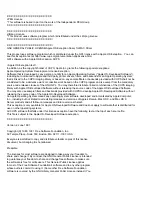
Troubleshooting
Printing Problems
B-5
B.5 Printing Problems
B.5.1 PostScript Problems
PostScript printers will silently abort jobs if they detect an error.
Table B-6: General Printing Problems
Area to Check
Explanation
Physical connections
To test a non-PostScript printer, use the Test Port EPS Count 100
command. This command will send 100 lines of test data out the
parallel port so you can see if the printer is receiving data.
Service characteristics
Use the Show Service Local Characteristics command from the
EPS Local> prompt to see if the desired service is available and to
verify that the appropriate protocols are enabled on the service.
The IP address
The IP address must be unique on the network. Many problems
can occur when there are duplicate IP addresses.
Queue Status and Port
counters
Use the Monitor Queue command to ensure queue entries appear
in the job list.
Use the Monitor Port n Counters command to verify that the
counter is incrementing with each job. If it is not, verify the
connection between the EPS and the printer.
Table B-7: PostScript Troubleshooting
Area to Check
Explanation
The EPS is communicating
with the printer
To test a PostScript printer, use the Test Port n PostScript
Count 2 command. This command will send 2 pages of
PostScript data out the parallel port. Watch the indicators on the
printer to verify that the EPS is communicating with the printer.
If the printer is capable of bidirectional communication, use the
Test Service EPS_xxxxxx_PS PostScript Count 5 command.
This will transfer data both to and from the printer.
Autoselection must be disabled and the printer must be
configured as a PostScript printer for this test to succeed.
The printer is configured to
use 8-bit characters
If special characters or bitmaps are not printing correctly, the
printer may be incorrectly configured to use 7-bit characters.
















































